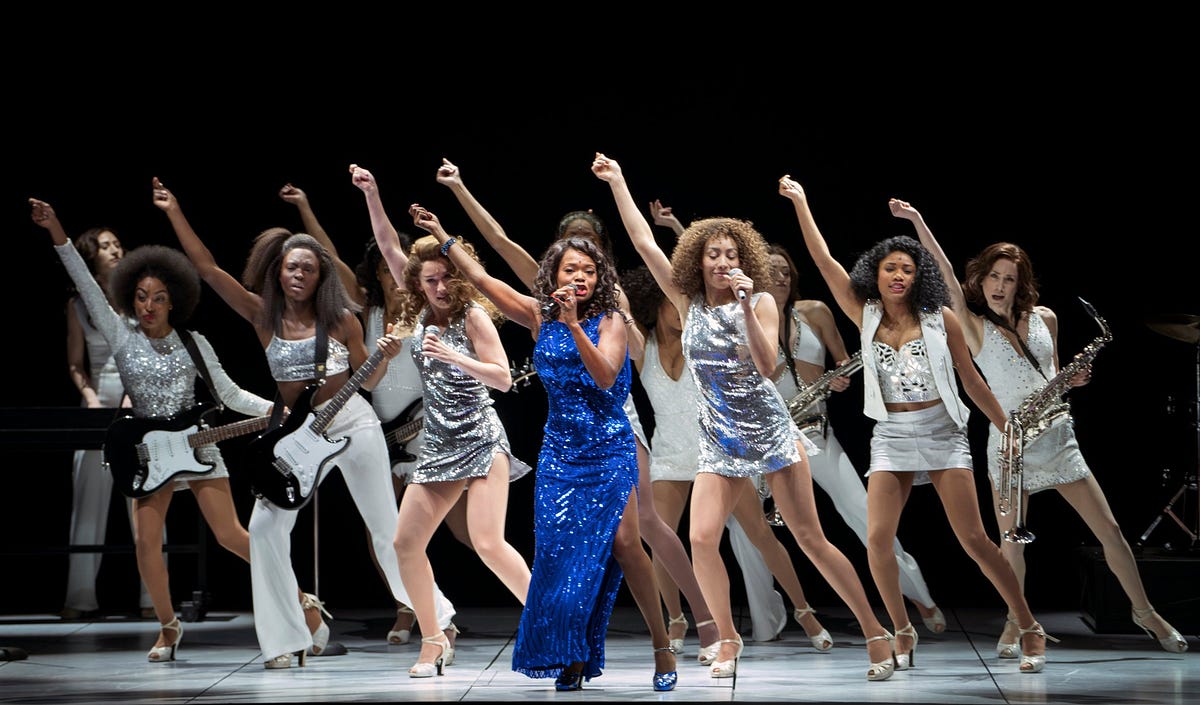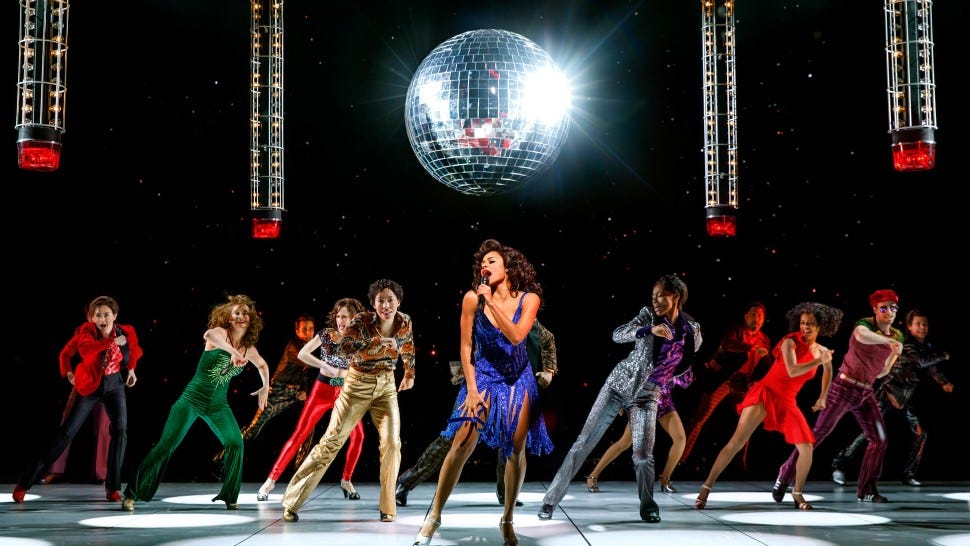Everyone may love “She Works Hard For the Money,” “Hot Stuff,” and “Last Dance” but liking Donna Summer’s music is no guarantee you will enjoy “Summer,” the new biopic jukebox musical that opened on Monday at the Lunt-Fontanne Theatre. If you are a real Donna Summer fan, you would have a much better evening reading her Wikipedia page with a Spotify playlist on than you will at “Summer.”
Like its equally unlikeable neighbor, “Escape to Margaritaville,” this musical includes all the hits from a single artist. But while “Margaritaville” adapts them into a plot, “Summer” attempts to use Donna Summer’s songs to tell her life story. However, book writers Colman Domingo, Robert Cary, and Des McAnuff (who also directed), do seem to not care about accuracy, controversy, clarity, or telling her life in order. Together they wrote perhaps one of the worst books for a musical in modern history.
The entire musical is framed as “a concert of a lifetime” in which a slightly aged Donna narrates to a crowd how she became the Queen of Disco. This lazy frame device is used to justify having three Donnas. Yes, you read that correctly: Diva Donna, Disco Donna, and Duckling Donna. This triple casting makes almost no sense and seems pointless. Other than some striking stage pictures of all three hitting the same pose, the triad structure is uncalled for and underutilized — they don’t even have amazing trio harmonies.
The musical goes through the life of Donna Summer, but not in any particular chronological order, jumping rapidly from contract negotiations, recording sessions, childhood sexual abuse, marriages, legal battles, cancer diagnoses, domestic abuse, a suicide attempt, motherhood, and homophobic rants. Early on Diva Donna says “I never see the whole picture, you know? All I see are fragments.” This must have been the mantra of the book writers and director, who made no attempt at crafting a nuanced (or accurate) narrative.

Anything difficult or unlikable the musical quickly jumps over. Donna Summer’s infamous “Adam and Eve, not Adam and Steve” comment is whisked away in a single line. Her mental health struggles are wrapped up in a brief scene. She narrates being molested by her priest between verses of a song. Everything that doesn’t pertain to a hit song is rapidly and tactlessly dealt with, all so the musical can get back to crowd favorites like “MacArthur Park” and “Bad Girls.”
That being said, the crowd favorites are incredibly well done. The Donna Summer fans in the audience clap and even dance along, proving the stereotype of musical jukebox fans who don’t care if it is a good musical they only care about the good music. Undeniably, the music is good, and thankfully our trio of Donnas do quite a good job with the legendary songs.
LaChanze as Diva Donna is magisterial, monarchical, and maternal. Most of the show she walks slowly around in glittering gowns or sits on stools narrating horribly-written inspirational speeches. Her star moment is the 11 o’clock number, “Friends Unknown,” performed at a piano in a single spotlight. She certainly comes the closest to looking and sounding like the real Donna Summer (but even that’s saying something because she doesn’t get that close).
Arianna DeBose gives a more than competent Disco Donna, and although LaChanze is the star of the production, most of the action happens to DeBose. Because of this, DeBose has to act the most and dance the most. She may not be the strongest actor, but she makes up for it by fiercely executing Sergio Trujillo’s spectacular disco choreography. Plus, she gets all the best costumes, ranging from miniskirts, to fur coats, to gowns, to fringe and beaded dance costumes (beautifully designed by Paul Tazewell, the only shining star in an otherwise confused design team).

Storm Lever sadly lives up to her character’s name, Duckling Donna, and certainly cannot compare to the more swan-like performance of her costars. She’s sweet and cute and tiny but not very memorable. The blame here is on the writing; it’s not her fault she was given almost nothing to work with.
The rest of the cast is inconsequential. Oddly, the almost entirely female ensemble is frequently in drag. This seemed like a desperate attempt at feminism (par for the course in this musical that mentions the wage gap and waits for applause) and was also unnecessary since there were male actors in the cast. The musical’s lack of male dancers perfectly fits the way the show complete erased Donna Summer’s massive fan base in the gay community.
Regardless of the performances, what made “Summer” almost unbearable was the dialogue, the direction, and the scenic design. The stage was almost completely bare other than several screens that flew in and out, projecting images straight from clip art: a lipstick when Donna is putting on makeup, cigarettes when she smokes for the first time, a microphone when she is recording. Robert Brill (set) and Sean Nieuwenhuis (projection) will not be forgiven anytime soon for this design flop. In addition to the oddly empty stage, for some unknowable reason, the Donnas almost exclusively exited and entered from rising and sinking platforms on the stage. The first time this theatrical device is used it is striking, but using it over 30 times in a 100-minute musical is the definition of overkill.
Unlike “Escape to Margaritaville” or “Jersey Boys,” it is unclear whether Donna Summer has the fan base to keep this musical alive. Pending the likely absence of awards, it would not be surprising if “Summer” announces a swift closing. Maybe in better hands, the life and music of the Queen of Disco could have been extraordinary, but here it falls flat.






